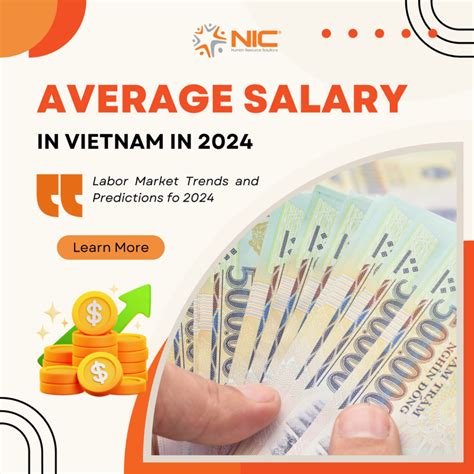Vietnam's economy is one of the fastest-growing in Southeast Asia, presenting a dynamic and attractive landscape for local professionals and expatriates alike. This rapid development has a direct impact on earning potential, making salary a key topic of interest. For those considering a career move to or within Vietnam, understanding the salary landscape is crucial. In 2024, the average monthly salary hovers around 7.6 million VND (approximately $300 USD), but this single figure only tells part of the story. Individual earnings can range from the national minimum wage to well over 100 million VND ($4,000+ USD) for senior specialists in high-demand fields.
This guide will break down the latest salary data for 2024, explore the critical factors that influence your earning potential, and provide insight into the country's promising job outlook.
Understanding Vietnam's Salary Landscape

Unlike a specific job title, the "average monthly salary" is a broad economic indicator that reflects the nation's overall income level. It's calculated by averaging the wages of workers across all industries, regions, and experience levels—from a factory worker in a rural province to a tech executive in Ho Chi Minh City.
Therefore, the national average serves as a vital benchmark, but it's essential to look at the underlying factors to understand what you can realistically expect to earn. Vietnam’s government sets a regional minimum wage, but most professional roles, especially in urban centers, pay significantly above this floor.
Average Monthly Salary in Vietnam: The 2024 Figures

Authoritative data provides the most accurate picture of the current salary environment in Vietnam.
According to the General Statistics Office (GSO) of Vietnam, the average monthly income per worker in the first quarter of 2024 was 7.6 million VND (approx. $300 USD). This represents a healthy increase from the previous year, highlighting the country's positive economic momentum.
However, data from professional salary aggregators, which often focus on a more urban and professional demographic, reveal a wider and higher range.
- Salary Explorer, a popular aggregator, reports an average salary of around 18.1 million VND ($710 USD) per month. Their data suggests a typical salary range from a low of 4.58 million VND ($180 USD) to a high of 80.8 million VND ($3,175 USD).
- It's important to note that such aggregators often rely on user-submitted data, which can skew towards white-collar professions and major cities.
The key takeaway is that while the national average is a useful economic statistic, your personal salary will be determined by a specific set of factors.
Key Factors That Influence Salary in Vietnam

Your background, location, and industry are the most significant drivers of your potential earnings in Vietnam. Here’s a breakdown of how each factor comes into play.
### Level of Education
Education remains a strong determinant of salary in Vietnam's competitive job market. While a high school diploma is sufficient for many entry-level service and manual labor jobs, a university degree is typically the minimum requirement for professional and office-based roles.
- Bachelor's Degree: This is the standard for most professional positions in fields like marketing, finance, and human resources, commanding salaries significantly higher than the national average.
- Master's Degree / MBA: An advanced degree often leads to specialized and management-level positions with a substantial salary premium. For roles in fields like data science, engineering management, or corporate finance, a Master's can increase earning potential by 30-50% or more compared to a Bachelor's degree.
### Years of Experience
Experience is arguably the most critical factor influencing salary. Employers in Vietnam place a high value on proven skills and a track record of success.
- Entry-Level (0-2 years): Professionals just starting their careers can expect to earn closer to the urban average, typically in the 10 - 15 million VND ($400 - $600 USD) range for professional roles.
- Mid-Career (3-8 years): With several years of experience, professionals develop valuable skills and can take on more responsibility. Salaries for mid-career individuals often range from 15 - 35 million VND ($600 - $1,375 USD).
- Senior/Managerial (8+ years): Senior professionals, managers, and directors with extensive experience are highly sought after. Their salaries can range from 40 million VND to over 100 million VND ($1,570 - $4,000+ USD), particularly in high-demand sectors.
### Geographic Location
Where you work in Vietnam has a massive impact on your salary. The economic hubs of Ho Chi Minh City (HCMC) and Hanoi command the highest salaries due to the concentration of multinational corporations, tech companies, and financial institutions.
- Ho Chi Minh City (HCMC): As the primary commercial hub, HCMC generally offers the highest salaries in the country.
- Hanoi: The capital city has a robust job market, particularly in government, manufacturing, and IT, with salaries that are competitive and nearly on par with HCMC.
- Other Urban Centers (e.g., Da Nang, Hai Phong): These cities are growing rapidly, particularly in tourism, logistics, and manufacturing. Salaries are competitive but typically 10-20% lower than in HCMC or Hanoi.
- Rural Areas: Wages in rural provinces are significantly lower and are more closely aligned with the national average and regional minimum wage levels.
### Company Type
The type of company you work for is another key salary differentiator.
- Multinational Corporations (MNCs): Foreign-invested companies, particularly those from North America and Europe, are known to be the top payers. They often have global salary scales and offer attractive benefits packages to attract top talent.
- Large Local Corporations (e.g., Vingroup, FPT): Top-tier Vietnamese companies offer competitive salaries and are major employers in the professional sector.
- Startups: The startup scene is booming, especially in tech. While salaries may be slightly lower than at MNCs, they are often supplemented with stock options (ESOP) and offer a dynamic work environment with high growth potential.
- Small and Medium-sized Enterprises (SMEs): Local SMEs make up the bulk of businesses in Vietnam. Salaries here vary widely but are generally lower than at larger corporations.
### Area of Specialization
Your industry and specific skill set are paramount. According to professional recruitment reports from firms like Robert Walters and Michael Page, certain specializations are in high demand and command premium salaries.
- Top-Tier Industries: Information Technology (especially in AI, data science, and software development), Manufacturing (supply chain and engineering management), Finance & Banking, and Real Estate are currently among the highest-paying sectors.
- In-Demand Skills: Professionals with skills in digital marketing, e-commerce, cloud computing, and renewable energy are highly sought after.
- Lower-Paying Sectors: Industries like agriculture, textiles (at the worker level), and general administration typically offer salaries closer to the national average.
Job Outlook

The economic outlook for Vietnam remains strong. The World Bank and Asian Development Bank (ADB) consistently forecast robust GDP growth for Vietnam, projecting a rate of around 5.5% to 6.0% for 2024. This growth is fueled by strong Foreign Direct Investment (FDI), a stable political environment, and a strategic shift in global supply chains that benefits Vietnamese manufacturing.
This positive economic forecast translates directly into a healthy job market. The demand for skilled labor continues to outpace supply in many key sectors, particularly in technology, digital transformation, and high-tech manufacturing. This creates significant opportunities and upward pressure on wages for qualified professionals.
Conclusion

Vietnam offers a world of opportunity for those looking to build a rewarding career. While the national average monthly salary of 7.6 million VND ($300 USD) provides a starting point, it's clear that individual earning potential is far more nuanced.
For prospective professionals and students, the key takeaways are:
- Aim for High-Growth Hubs: Focus your job search on major cities like Ho Chi Minh City and Hanoi for the highest earning potential.
- Specialize in In-Demand Fields: Building expertise in technology, digital skills, or supply chain management can dramatically increase your value.
- Experience is King: Consistently building your professional experience will unlock significant salary growth over time.
- Target MNCs: For the highest base salaries and benefits, multinational corporations remain the top choice.
Vietnam's economy is on an impressive trajectory, and for those with the right skills, education, and strategic approach, the potential for professional and financial growth is exceptional.
